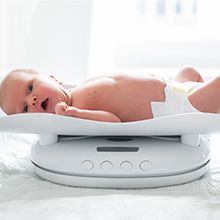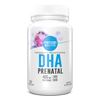DHA Prenatal Pregnancy & Breastfeeding
Significant amounts of omega-3 docosahexaenoic acid (DHA) are transferred from maternal to fetal blood, ensuring high levels of DHA in the placenta and fetal bloodstream and tissues. Fetal DHA demand increases exponentially with gestational age, especially in the third trimester, due to fetal development.

FULL TERM PREGNANCY
Your baby is considered full-term once you reach 39 weeks. They use every bit of that time to grow and develop vital organs like their brain, lungs, and liver. Research suggests that DHA can help support a healthy full-term birth, allowing your little one to fully develop and giving them plenty of time to prepare to enter the world.

HEALTHY BIRTH WEIGHT
Having a smaller baby does not necessarily mean your little one is not healthy. But babies who are born too small may face challenges with breastfeeding and immune health and may even have trouble reaching milestones as they grow. In addition to promoting full-term birth, DHA may also help support a healthy birth weight.

BRAIN AND EYE HEALTH
Omega-3 fatty acids, including EPA and DHA, are the building blocks of a baby’s brain and retina. *According to Elizabeth Ward, MS, RD; an expert on nutrition during pregnancy and the author of Expect the Best, your baby’s brain and eyes utilize DHA during the second trimester of pregnancy up until age two.

HEALTHY ATTENTION SPAN
It Is no secret that prenatal nutrition is important to help support a healthy pregnancy and baby. But it Is Incredible that your nutrition during pregnancy can help your little one for years to come. Studies suggest that DHA during pregnancy may support healthy attention spans in preschool children.
1 Review
-
Reputable product!
I am confident this is a clean product to take while pregnant and while nursing!























